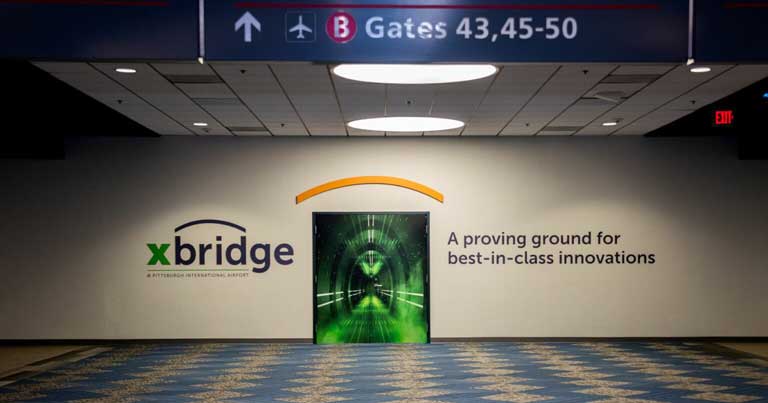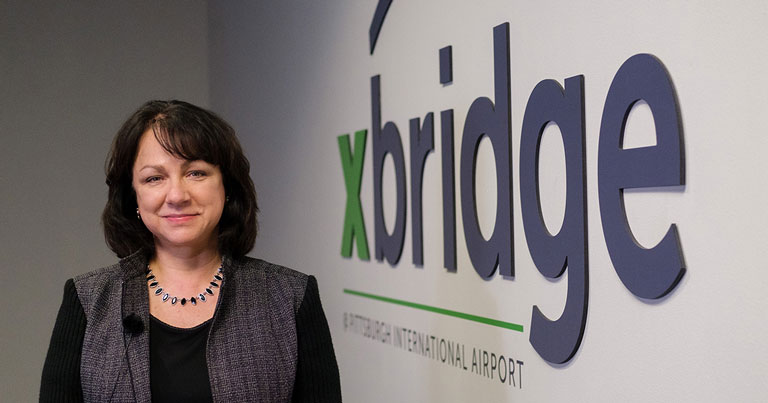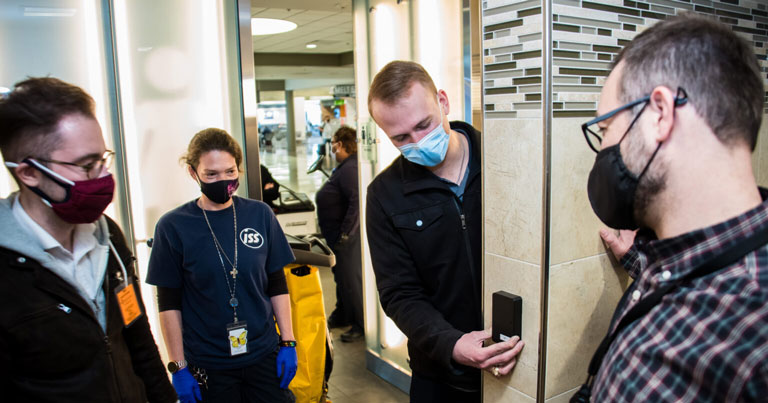
Pittsburgh International Airport (PIT), a member of the FTE Innovation & Startup Hub, recently opened its new innovation centre called xBridge, designed to support the evolution of the industry and inspire creative solutions to address industry challenges. Katherine Karolick, Senior Vice President of Information Technology at PIT, who leads the xBridge initiative, spoke to FTE about the airport’s ambitions to drive the industry recovery by tapping into a large ecosystem of travel tech partners.
Physical manifestation of PIT’s innovative mentality

The 10,000-square-foot facility, located at the airport’s Concourse B, consists of a custom-built innovation space, maker space, an open design studio, and mock-ups of the various parts of an airport, such as concessions and the arrivals area. The centre’s focal point is the xGate – a functional boarding gate that operates as a working lab to test out concepts to improve air travel. “The xGate will be able to simulate a real, active gate and holding area,” Karolick tells FTE. “And we can also test innovations on pilot flights coming in with our airline partners.”
The idea behind the innovation centre was born before the COVID-19 crisis, but the pandemic slowed down the opening of the centre, as the airport remained focused on more immediate priorities such as addressing safety and biosecurity, while reducing operational costs. The airport, however, recognised the need to get innovative solutions quickly and effectively, and by November 2020 the innovation centre had opened doors.
“We’ve always been strong innovators and we were starting to look at technology and innovation and recognising that we were at a point where we needed a dedicated space. When the pandemic hit, we had to pivot and really start looking at technologies to solve the new issues around biosecurity, as well as a much stronger drive towards cost-effective solutions because of the financial implications of the pandemic. Innovation happens without the space, but the space adds that extra element of collaboration, ideation and testing.”
Pittsburgh’s tech community bringing AI, ML and robotics to the airport
Working in tandem with other companies from within Pittsburgh’s tech community is a key part of the xBridge strategy. “We’re fortunate to be in Pittsburgh where we can tap into the talent that we have,” shares Karolick. “We have Carnegie Mellon University, as well as many other colleges and we have a lot of startups in the area of artificial intelligence, robotics and autonomous technology.”
The airport recently launched a new partnership with Carnegie Mellon University to use advanced technology to increase the efficiency of restroom cleaning. The aim of the trial is to calculate real-time, smarter cleaning schedules using artificial intelligence (AI) that takes into account when and where flights are coming in, how many people are using a restroom based on a beam that counts people as they approach, and, eventually, sensors that alert staff when soap needs to be refilled and garbage needs to be emptied.

A number of homegrown tech firms have also already joined Pittsburgh’s new innovation centre, including Zensors, Carnegie Robotics and RE2.
The airport has worked with FTE Startup Hub member Zensors since 2019, when the startup developed and deployed cameras around the security checkpoint that use an AI system to calculate wait times in real time. Building on this momentum, the partnership will continue to explore the use of AI to enhance the passenger experience.
Last year, PIT became the first airport in the US to rollout out autonomous robotic floor scrubbers with ultraviolet (UV) light in partnership with Carnegie Robotics. There are now four self-driving scrubbers in use at the airport, and since the launch of the partnership, the company has been able to further advance the designs of the scrubbers with stronger UV to increase the disinfection levels. Pittsburgh Airport is also looking into developing robotics technology that can empower the human workforce to do their jobs safely and effectively, in partnership with RE2.
Meanwhile, Fortune 100 company Honeywell has also selected xBridge as the place to test and develop its products. The company is using xBridge to create a live dashboard measuring air quality, which will help airport staff identify and correct issues in real time. A network of sensors connected to the dashboard, which is integrated into existing systems within the airport, provide real-time updates on air quality to help facilities staff quickly identify and correct critical building issues to help reduce the spread of airborne disease such as COVID-19. Based on the success of recent pilot systems, PIT is looking to expand the technology throughout the airport.
Karolick shares that more partnership commitments are in the pipeline as companies are ready to take proof of concepts to pilot projects and need a real-world environment to do that. “Innovation at its best includes startups, midsize tech, big tech, and universities. We have that in Pittsburgh and xBridge taps into the talent of the region. For our partners, having the ecosystem in our innovation centre is critical.”
What is truly unique about the xBridge concept is that it allows Pittsburgh Airport to develop cutting-edge solutions that address current industry challenges in conjunction with these companies, positioning itself at the forefront of the industry recovery. “We’re looking at ways to improve public health through partnerships such as the one with Honeywell and Carnegie Mellon and these other Pittsburgh startups. Together we can really speed up the recovery,” she concludes.






